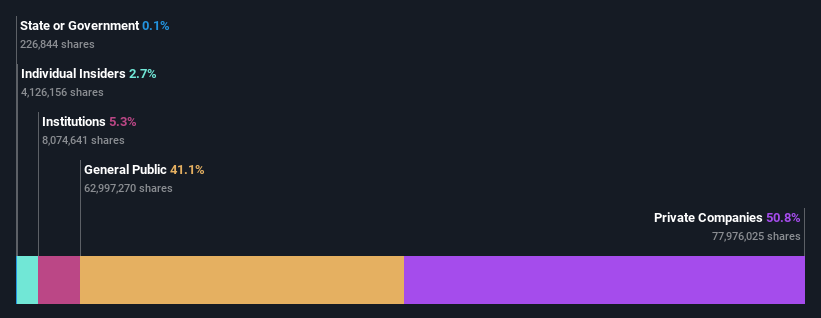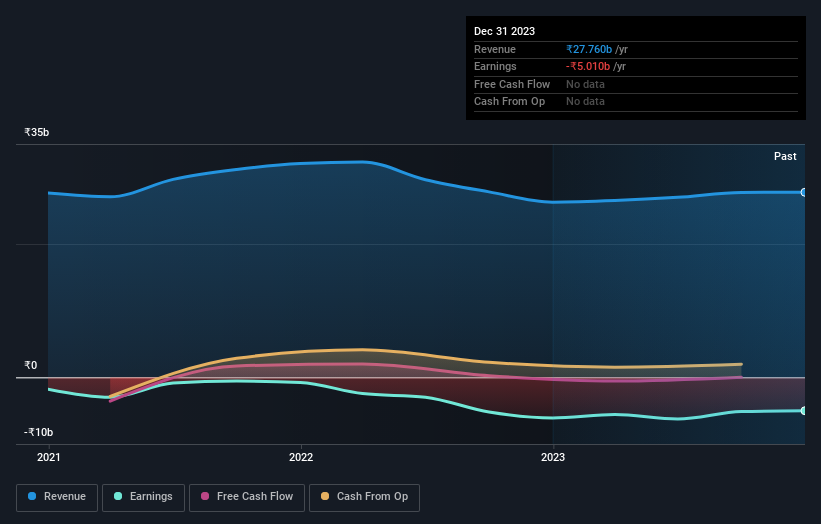Stock Analysis
Private companies are Wockhardt Limited's (NSE:WOCKPHARMA) biggest owners and were rewarded after market cap rose by ₹4.2b last week

Key Insights
- Significant control over Wockhardt by private companies implies that the general public has more power to influence management and governance-related decisions
- 51% of the business is held by the top 4 shareholders
- Using data from company's past performance alongside ownership research, one can better assess the future performance of a company
A look at the shareholders of Wockhardt Limited (NSE:WOCKPHARMA) can tell us which group is most powerful. The group holding the most number of shares in the company, around 51% to be precise, is private companies. In other words, the group stands to gain the most (or lose the most) from their investment into the company.
Clearly, private companies benefitted the most after the company's market cap rose by ₹4.2b last week.
In the chart below, we zoom in on the different ownership groups of Wockhardt.
Check out our latest analysis for Wockhardt

What Does The Institutional Ownership Tell Us About Wockhardt?
Institutional investors commonly compare their own returns to the returns of a commonly followed index. So they generally do consider buying larger companies that are included in the relevant benchmark index.
Wockhardt already has institutions on the share registry. Indeed, they own a respectable stake in the company. This can indicate that the company has a certain degree of credibility in the investment community. However, it is best to be wary of relying on the supposed validation that comes with institutional investors. They too, get it wrong sometimes. When multiple institutions own a stock, there's always a risk that they are in a 'crowded trade'. When such a trade goes wrong, multiple parties may compete to sell stock fast. This risk is higher in a company without a history of growth. You can see Wockhardt's historic earnings and revenue below, but keep in mind there's always more to the story.

We note that hedge funds don't have a meaningful investment in Wockhardt. Humuza Consultants is currently the largest shareholder, with 43% of shares outstanding. In comparison, the second and third largest shareholders hold about 3.3% and 2.6% of the stock.
Our research also brought to light the fact that roughly 51% of the company is controlled by the top 4 shareholders suggesting that these owners wield significant influence on the business.
Researching institutional ownership is a good way to gauge and filter a stock's expected performance. The same can be achieved by studying analyst sentiments. Our information suggests that there isn't any analyst coverage of the stock, so it is probably little known.
Insider Ownership Of Wockhardt
While the precise definition of an insider can be subjective, almost everyone considers board members to be insiders. The company management answer to the board and the latter should represent the interests of shareholders. Notably, sometimes top-level managers are on the board themselves.
Most consider insider ownership a positive because it can indicate the board is well aligned with other shareholders. However, on some occasions too much power is concentrated within this group.
We can report that insiders do own shares in Wockhardt Limited. The insiders have a meaningful stake worth ₹2.4b. Most would see this as a real positive. If you would like to explore the question of insider alignment, you can click here to see if insiders have been buying or selling.
General Public Ownership
With a 41% ownership, the general public, mostly comprising of individual investors, have some degree of sway over Wockhardt. This size of ownership, while considerable, may not be enough to change company policy if the decision is not in sync with other large shareholders.
Private Company Ownership
Our data indicates that Private Companies hold 51%, of the company's shares. It's hard to draw any conclusions from this fact alone, so its worth looking into who owns those private companies. Sometimes insiders or other related parties have an interest in shares in a public company through a separate private company.
Next Steps:
It's always worth thinking about the different groups who own shares in a company. But to understand Wockhardt better, we need to consider many other factors. For instance, we've identified 2 warning signs for Wockhardt (1 is potentially serious) that you should be aware of.
Of course this may not be the best stock to buy. So take a peek at this free free list of interesting companies.
NB: Figures in this article are calculated using data from the last twelve months, which refer to the 12-month period ending on the last date of the month the financial statement is dated. This may not be consistent with full year annual report figures.
Valuation is complex, but we're helping make it simple.
Find out whether Wockhardt is potentially over or undervalued by checking out our comprehensive analysis, which includes fair value estimates, risks and warnings, dividends, insider transactions and financial health.
View the Free AnalysisHave feedback on this article? Concerned about the content? Get in touch with us directly. Alternatively, email editorial-team (at) simplywallst.com.
This article by Simply Wall St is general in nature. We provide commentary based on historical data and analyst forecasts only using an unbiased methodology and our articles are not intended to be financial advice. It does not constitute a recommendation to buy or sell any stock, and does not take account of your objectives, or your financial situation. We aim to bring you long-term focused analysis driven by fundamental data. Note that our analysis may not factor in the latest price-sensitive company announcements or qualitative material. Simply Wall St has no position in any stocks mentioned.
About NSEI:WOCKPHARMA
Wockhardt
Wockhardt Limited, a pharmaceutical and biotech company, manufactures and markets pharmaceuticals, medicinal, and chemical products in India, the United States, the United Kingdom, Switzerland, Ireland, Mexico, Russia, and internationally.
Adequate balance sheet and overvalued.

